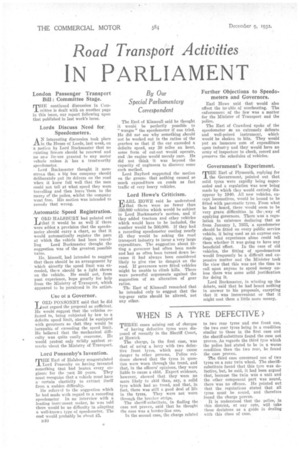Road Transport Activities
Page 54

If you've noticed an error in this article please click here to report it so we can fix it.
IN PARLIAMENT
By Our Special Parliamentary Correspondent London Passenger Transport Bill : Committee Stage.
THEcontinued discussion in Committee is dealt with on another page in this issue, our report following upon that published in last week's issue.
Lords Discuss Need for Speedometers.
AN interesting discussion took place in the House of Lords, last week, on a motion by Lord Buckmaster that no existing liceade should be renewed and no new lick nce granted to any motor vehicle unless it has a trustworthy speedometer.
• Lord Huckmaster thought it monstrolls that a big bus company should deliberately put its drivers on the road when it knew full well that the men could not tell at what speed they were travelling and then leave 'them to the mercy of the police, whilst the company went free. His motion was intended to remedy that wrong.
Automatic Speed Registration.
LORD HALSBURY had pointed out that it would be as well if there were added a provision that the speedometer should carry a chart, so that it would automatically register the pace at which the vehicle had been travel
ling Lord Buckmaster thought the suggestion was of the greatest possible value.
He, himself, had intended to suggest that there should be an arrangement by which directly the speed limit was exceeded, theee should be a light shown on the vehicle. He could not, from past experience, hope greatly for help from the Ministry of Transport, which appeared to be paralysed in its action.
Use of a Governor.
LORD PONSONBX said that he did not regard the proposal as sufficient. He would suggest that the vehicles referred to, being subjected by law to a definite speed limit, should be equipped with governors so thdt they would be incapable of exceeding the speed limit. He believed that the mechanical difficulty was quite easily overcome. He would protest only mildly against remarks about the Ministry of Transport.
Lord Ponsonby's Invention.
THE Earl of liaIsbury congratulated Lord Ponsonby on having invented something that had beaten every en gineer for the -fast 50 years. They must recognise that a vehicle must have a. certain elasticity to extract itself from a sudden difficulty.
He refervd to the suggestion which he had made with regard to a recording speedometer In an interview with a leading instrlment maker, he Was told there would be no difficulty in adapting a well-knowd type of speedometer. The cost would probably be about £.5.
B10
The Earl of Kinnoull said he thought it would be perfectly possible to "wangle" the speedometer if one tried. He did not see why something should not be worked out in the ratios of the gearbox so that if the car exceeded a definite speed, say 30 miles an hour, some form of cut-out would operate, and he engine would merely race. He did not think it was beyond the capacity of engineers to discover some such method.
Lord Hayford supported the motion on the grouni, that nothing caused so much expenditure on roads as fast traffic of very heavy vehicles.
Lord Howe's Criticism. • EARL HOWE said he understood that there were no fewer than 350,000 vehicles which would be subject to Lord Buckmaster's motion, and if they added tractors and other vehicles which would have to be included, the number would be 500,000. If they had a recording speedometer costing nearly .f5 they would be asking the road transport industry to incur a very large expenditure. The suggestion about fitting a governor had often been made and hau as often been turned down because it had always been considered likely to give rise to dangers on the road. If governors were fitted vehicles might be unable to climb hills. There were powerful arguments against the suggestion of an alteration of gear ratios.
The Earl of Kinnoull remarked that he intended only to suggest that the top-gear ratio should be altered, not any other.
Further Objections to Speedometers and Governors.
Earl Howe said that would also affect the trr uble of overheating. The enforcement of the law was a matter for the Minister of Transport and the police.
The Earl of Crawford spoke of the speedometer as an extremely delicate and well-poised instrument, which would be shaken to bits. They would Put an immense sum of expenditure upon industry and they would have an army of inspectors to check, record and preserve the schedules of vehicles.
Government's Experiment. THE Earl of Plymouth, replying for the Government, pointed out that solid tyres were rapidly being superseded and a regulation was now being made by which they would entirely disappear by 1940. All new vehicles, except locomotives, would be bound to be fitted with pneumatic tyres. From what he had heard, there would seem to be very grave difficulties in the way of applying governors. There was a regulation in existence declaring that as from January 1, 1933, a speedometer should be fitted on every public service vehicle, if being used as an express carriage, and experience alone could tell them whether it was going to have any
beneficial effect. In the case of old vehicles, the fitting of speedometers would frequently be a difficult and expensive matter and the Minister took the view that this was not the time to call upon anyone to spend money unless there was some solid justification for doing it.
Lord l3nekmaster, in winding up the debate, said that he had heard nothing in answer to his proposals, excepting that it was inconvenient or that it might cost them a little more money.




























































































